A Case Study on the Impact of ERP Systems on Tesco's Operations
VerifiedAdded on 2020/11/12
|23
|6672
|73
Report
AI Summary
This report examines the impact of Enterprise Resource Planning (ERP) systems on the operations and functions of Tesco, a major retailer. It begins with an introduction to ERP, its background, aim, and objectives, followed by a literature review exploring the meaning and concept of ERP, its importance in accomplishing company functions, and its impact on operations. The research methodology is outlined, followed by data analysis, recommendations, and a conclusion. The study highlights how ERP integrates various departments, improves productivity, reduces working capital, and enhances communication and decision-making within Tesco. The report also acknowledges potential challenges, such as process and correspondence failures, and emphasizes the importance of effective implementation for achieving business objectives. The study provides a comprehensive analysis of ERP's role in optimizing business processes and maintaining a competitive edge in the retail sector.
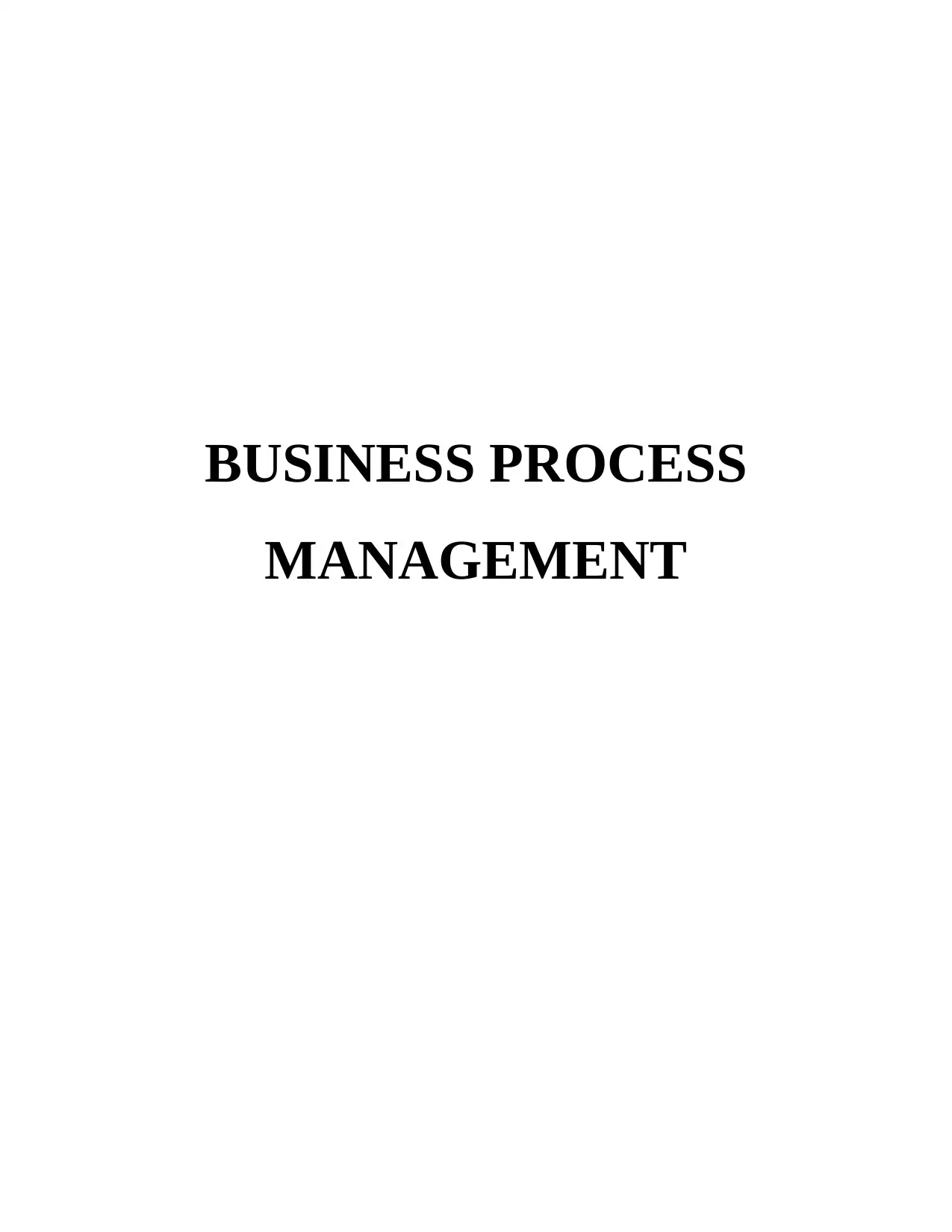
BUSINESS PROCESS
MANAGEMENT
MANAGEMENT
Paraphrase This Document
Need a fresh take? Get an instant paraphrase of this document with our AI Paraphraser
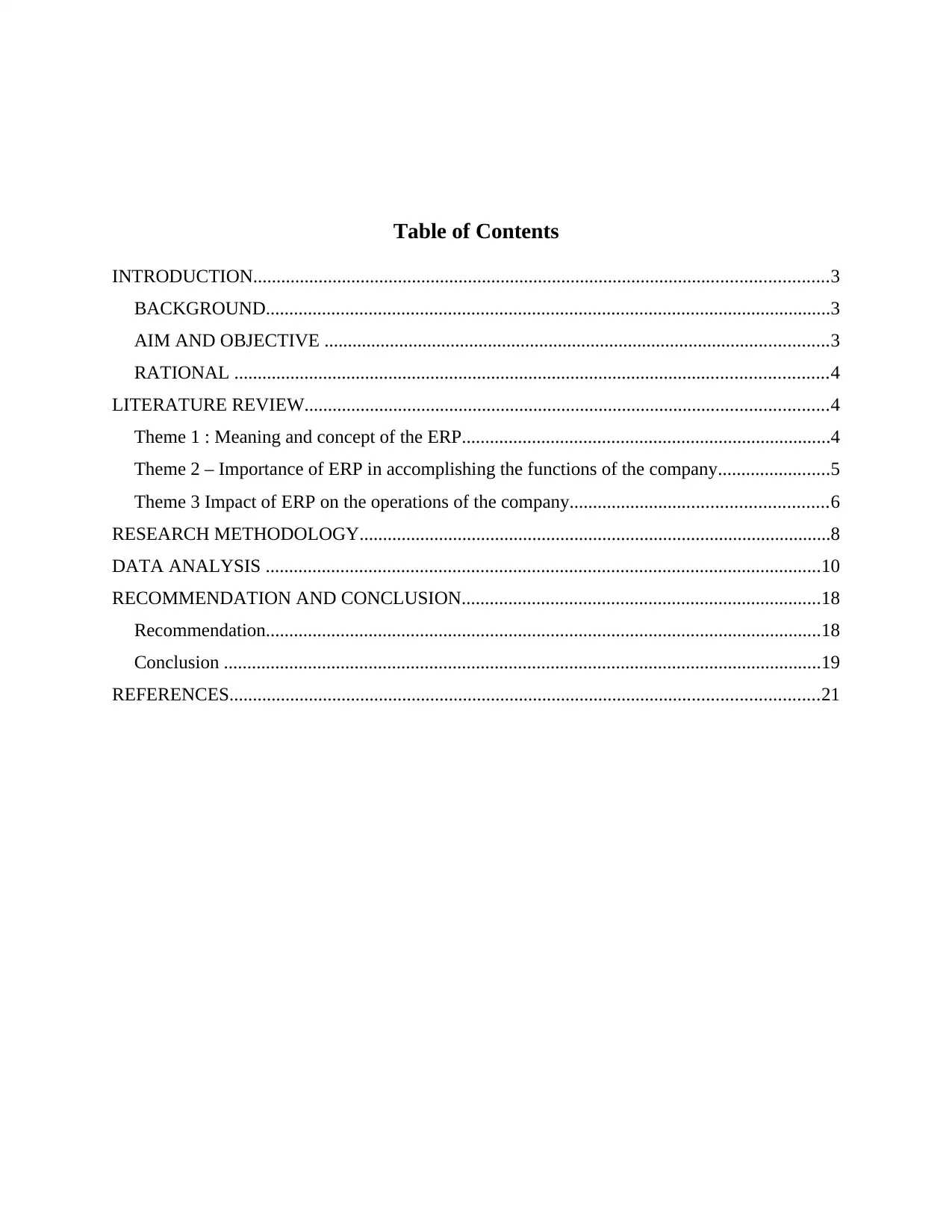
Table of Contents
INTRODUCTION...........................................................................................................................3
BACKGROUND.........................................................................................................................3
AIM AND OBJECTIVE ............................................................................................................3
RATIONAL ...............................................................................................................................4
LITERATURE REVIEW................................................................................................................4
Theme 1 : Meaning and concept of the ERP...............................................................................4
Theme 2 – Importance of ERP in accomplishing the functions of the company........................5
Theme 3 Impact of ERP on the operations of the company.......................................................6
RESEARCH METHODOLOGY.....................................................................................................8
DATA ANALYSIS .......................................................................................................................10
RECOMMENDATION AND CONCLUSION.............................................................................18
Recommendation.......................................................................................................................18
Conclusion ................................................................................................................................19
REFERENCES..............................................................................................................................21
INTRODUCTION...........................................................................................................................3
BACKGROUND.........................................................................................................................3
AIM AND OBJECTIVE ............................................................................................................3
RATIONAL ...............................................................................................................................4
LITERATURE REVIEW................................................................................................................4
Theme 1 : Meaning and concept of the ERP...............................................................................4
Theme 2 – Importance of ERP in accomplishing the functions of the company........................5
Theme 3 Impact of ERP on the operations of the company.......................................................6
RESEARCH METHODOLOGY.....................................................................................................8
DATA ANALYSIS .......................................................................................................................10
RECOMMENDATION AND CONCLUSION.............................................................................18
Recommendation.......................................................................................................................18
Conclusion ................................................................................................................................19
REFERENCES..............................................................................................................................21
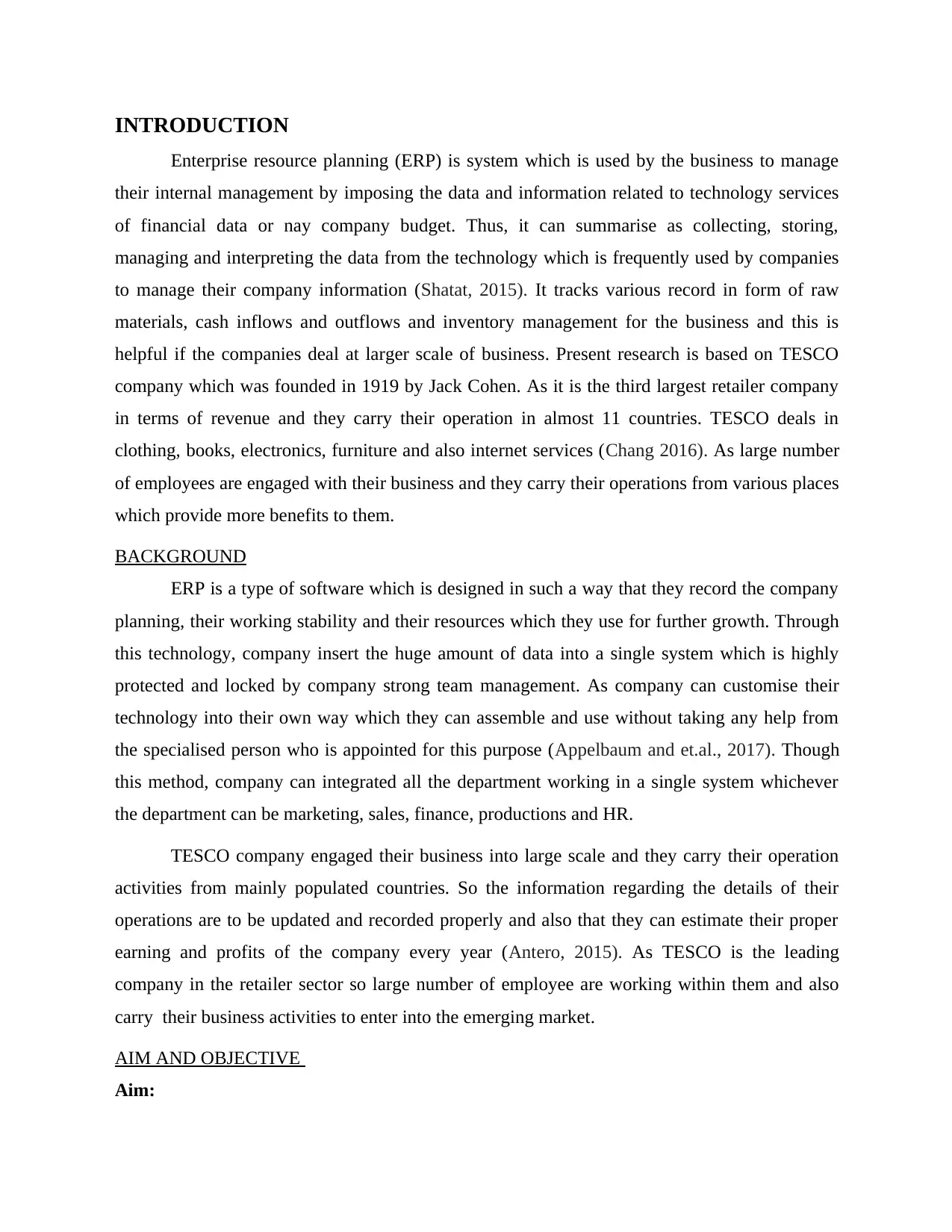
INTRODUCTION
Enterprise resource planning (ERP) is system which is used by the business to manage
their internal management by imposing the data and information related to technology services
of financial data or nay company budget. Thus, it can summarise as collecting, storing,
managing and interpreting the data from the technology which is frequently used by companies
to manage their company information (Shatat, 2015). It tracks various record in form of raw
materials, cash inflows and outflows and inventory management for the business and this is
helpful if the companies deal at larger scale of business. Present research is based on TESCO
company which was founded in 1919 by Jack Cohen. As it is the third largest retailer company
in terms of revenue and they carry their operation in almost 11 countries. TESCO deals in
clothing, books, electronics, furniture and also internet services (Chang 2016). As large number
of employees are engaged with their business and they carry their operations from various places
which provide more benefits to them.
BACKGROUND
ERP is a type of software which is designed in such a way that they record the company
planning, their working stability and their resources which they use for further growth. Through
this technology, company insert the huge amount of data into a single system which is highly
protected and locked by company strong team management. As company can customise their
technology into their own way which they can assemble and use without taking any help from
the specialised person who is appointed for this purpose (Appelbaum and et.al., 2017). Though
this method, company can integrated all the department working in a single system whichever
the department can be marketing, sales, finance, productions and HR.
TESCO company engaged their business into large scale and they carry their operation
activities from mainly populated countries. So the information regarding the details of their
operations are to be updated and recorded properly and also that they can estimate their proper
earning and profits of the company every year (Antero, 2015). As TESCO is the leading
company in the retailer sector so large number of employee are working within them and also
carry their business activities to enter into the emerging market.
AIM AND OBJECTIVE
Aim:
Enterprise resource planning (ERP) is system which is used by the business to manage
their internal management by imposing the data and information related to technology services
of financial data or nay company budget. Thus, it can summarise as collecting, storing,
managing and interpreting the data from the technology which is frequently used by companies
to manage their company information (Shatat, 2015). It tracks various record in form of raw
materials, cash inflows and outflows and inventory management for the business and this is
helpful if the companies deal at larger scale of business. Present research is based on TESCO
company which was founded in 1919 by Jack Cohen. As it is the third largest retailer company
in terms of revenue and they carry their operation in almost 11 countries. TESCO deals in
clothing, books, electronics, furniture and also internet services (Chang 2016). As large number
of employees are engaged with their business and they carry their operations from various places
which provide more benefits to them.
BACKGROUND
ERP is a type of software which is designed in such a way that they record the company
planning, their working stability and their resources which they use for further growth. Through
this technology, company insert the huge amount of data into a single system which is highly
protected and locked by company strong team management. As company can customise their
technology into their own way which they can assemble and use without taking any help from
the specialised person who is appointed for this purpose (Appelbaum and et.al., 2017). Though
this method, company can integrated all the department working in a single system whichever
the department can be marketing, sales, finance, productions and HR.
TESCO company engaged their business into large scale and they carry their operation
activities from mainly populated countries. So the information regarding the details of their
operations are to be updated and recorded properly and also that they can estimate their proper
earning and profits of the company every year (Antero, 2015). As TESCO is the leading
company in the retailer sector so large number of employee are working within them and also
carry their business activities to enter into the emerging market.
AIM AND OBJECTIVE
Aim:
⊘ This is a preview!⊘
Do you want full access?
Subscribe today to unlock all pages.

Trusted by 1+ million students worldwide
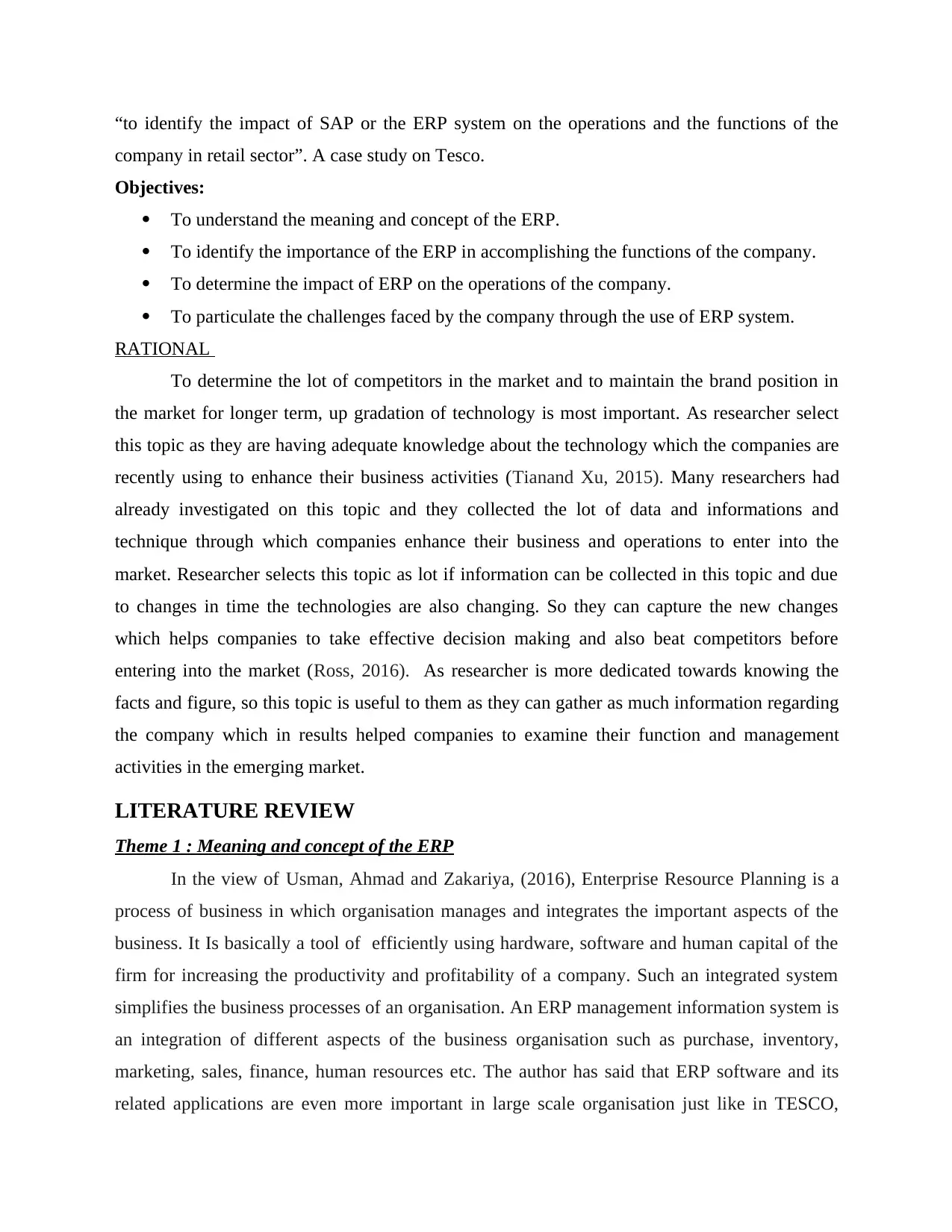
“to identify the impact of SAP or the ERP system on the operations and the functions of the
company in retail sector”. A case study on Tesco.
Objectives:
To understand the meaning and concept of the ERP.
To identify the importance of the ERP in accomplishing the functions of the company.
To determine the impact of ERP on the operations of the company.
To particulate the challenges faced by the company through the use of ERP system.
RATIONAL
To determine the lot of competitors in the market and to maintain the brand position in
the market for longer term, up gradation of technology is most important. As researcher select
this topic as they are having adequate knowledge about the technology which the companies are
recently using to enhance their business activities (Tianand Xu, 2015). Many researchers had
already investigated on this topic and they collected the lot of data and informations and
technique through which companies enhance their business and operations to enter into the
market. Researcher selects this topic as lot if information can be collected in this topic and due
to changes in time the technologies are also changing. So they can capture the new changes
which helps companies to take effective decision making and also beat competitors before
entering into the market (Ross, 2016). As researcher is more dedicated towards knowing the
facts and figure, so this topic is useful to them as they can gather as much information regarding
the company which in results helped companies to examine their function and management
activities in the emerging market.
LITERATURE REVIEW
Theme 1 : Meaning and concept of the ERP
In the view of Usman, Ahmad and Zakariya, (2016), Enterprise Resource Planning is a
process of business in which organisation manages and integrates the important aspects of the
business. It Is basically a tool of efficiently using hardware, software and human capital of the
firm for increasing the productivity and profitability of a company. Such an integrated system
simplifies the business processes of an organisation. An ERP management information system is
an integration of different aspects of the business organisation such as purchase, inventory,
marketing, sales, finance, human resources etc. The author has said that ERP software and its
related applications are even more important in large scale organisation just like in TESCO,
company in retail sector”. A case study on Tesco.
Objectives:
To understand the meaning and concept of the ERP.
To identify the importance of the ERP in accomplishing the functions of the company.
To determine the impact of ERP on the operations of the company.
To particulate the challenges faced by the company through the use of ERP system.
RATIONAL
To determine the lot of competitors in the market and to maintain the brand position in
the market for longer term, up gradation of technology is most important. As researcher select
this topic as they are having adequate knowledge about the technology which the companies are
recently using to enhance their business activities (Tianand Xu, 2015). Many researchers had
already investigated on this topic and they collected the lot of data and informations and
technique through which companies enhance their business and operations to enter into the
market. Researcher selects this topic as lot if information can be collected in this topic and due
to changes in time the technologies are also changing. So they can capture the new changes
which helps companies to take effective decision making and also beat competitors before
entering into the market (Ross, 2016). As researcher is more dedicated towards knowing the
facts and figure, so this topic is useful to them as they can gather as much information regarding
the company which in results helped companies to examine their function and management
activities in the emerging market.
LITERATURE REVIEW
Theme 1 : Meaning and concept of the ERP
In the view of Usman, Ahmad and Zakariya, (2016), Enterprise Resource Planning is a
process of business in which organisation manages and integrates the important aspects of the
business. It Is basically a tool of efficiently using hardware, software and human capital of the
firm for increasing the productivity and profitability of a company. Such an integrated system
simplifies the business processes of an organisation. An ERP management information system is
an integration of different aspects of the business organisation such as purchase, inventory,
marketing, sales, finance, human resources etc. The author has said that ERP software and its
related applications are even more important in large scale organisation just like in TESCO,
Paraphrase This Document
Need a fresh take? Get an instant paraphrase of this document with our AI Paraphraser
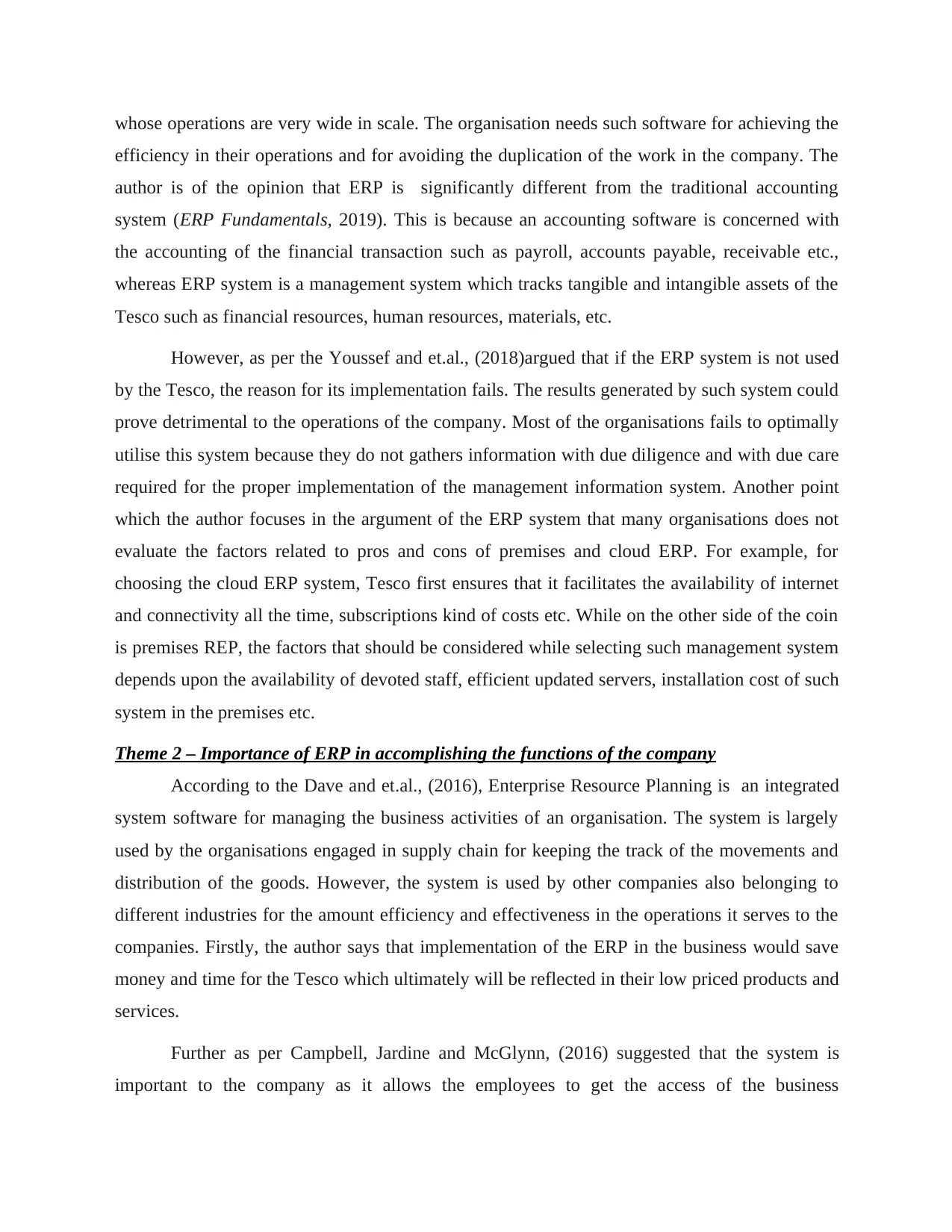
whose operations are very wide in scale. The organisation needs such software for achieving the
efficiency in their operations and for avoiding the duplication of the work in the company. The
author is of the opinion that ERP is significantly different from the traditional accounting
system (ERP Fundamentals, 2019). This is because an accounting software is concerned with
the accounting of the financial transaction such as payroll, accounts payable, receivable etc.,
whereas ERP system is a management system which tracks tangible and intangible assets of the
Tesco such as financial resources, human resources, materials, etc.
However, as per the Youssef and et.al., (2018)argued that if the ERP system is not used
by the Tesco, the reason for its implementation fails. The results generated by such system could
prove detrimental to the operations of the company. Most of the organisations fails to optimally
utilise this system because they do not gathers information with due diligence and with due care
required for the proper implementation of the management information system. Another point
which the author focuses in the argument of the ERP system that many organisations does not
evaluate the factors related to pros and cons of premises and cloud ERP. For example, for
choosing the cloud ERP system, Tesco first ensures that it facilitates the availability of internet
and connectivity all the time, subscriptions kind of costs etc. While on the other side of the coin
is premises REP, the factors that should be considered while selecting such management system
depends upon the availability of devoted staff, efficient updated servers, installation cost of such
system in the premises etc.
Theme 2 – Importance of ERP in accomplishing the functions of the company
According to the Dave and et.al., (2016), Enterprise Resource Planning is an integrated
system software for managing the business activities of an organisation. The system is largely
used by the organisations engaged in supply chain for keeping the track of the movements and
distribution of the goods. However, the system is used by other companies also belonging to
different industries for the amount efficiency and effectiveness in the operations it serves to the
companies. Firstly, the author says that implementation of the ERP in the business would save
money and time for the Tesco which ultimately will be reflected in their low priced products and
services.
Further as per Campbell, Jardine and McGlynn, (2016) suggested that the system is
important to the company as it allows the employees to get the access of the business
efficiency in their operations and for avoiding the duplication of the work in the company. The
author is of the opinion that ERP is significantly different from the traditional accounting
system (ERP Fundamentals, 2019). This is because an accounting software is concerned with
the accounting of the financial transaction such as payroll, accounts payable, receivable etc.,
whereas ERP system is a management system which tracks tangible and intangible assets of the
Tesco such as financial resources, human resources, materials, etc.
However, as per the Youssef and et.al., (2018)argued that if the ERP system is not used
by the Tesco, the reason for its implementation fails. The results generated by such system could
prove detrimental to the operations of the company. Most of the organisations fails to optimally
utilise this system because they do not gathers information with due diligence and with due care
required for the proper implementation of the management information system. Another point
which the author focuses in the argument of the ERP system that many organisations does not
evaluate the factors related to pros and cons of premises and cloud ERP. For example, for
choosing the cloud ERP system, Tesco first ensures that it facilitates the availability of internet
and connectivity all the time, subscriptions kind of costs etc. While on the other side of the coin
is premises REP, the factors that should be considered while selecting such management system
depends upon the availability of devoted staff, efficient updated servers, installation cost of such
system in the premises etc.
Theme 2 – Importance of ERP in accomplishing the functions of the company
According to the Dave and et.al., (2016), Enterprise Resource Planning is an integrated
system software for managing the business activities of an organisation. The system is largely
used by the organisations engaged in supply chain for keeping the track of the movements and
distribution of the goods. However, the system is used by other companies also belonging to
different industries for the amount efficiency and effectiveness in the operations it serves to the
companies. Firstly, the author says that implementation of the ERP in the business would save
money and time for the Tesco which ultimately will be reflected in their low priced products and
services.
Further as per Campbell, Jardine and McGlynn, (2016) suggested that the system is
important to the company as it allows the employees to get the access of the business
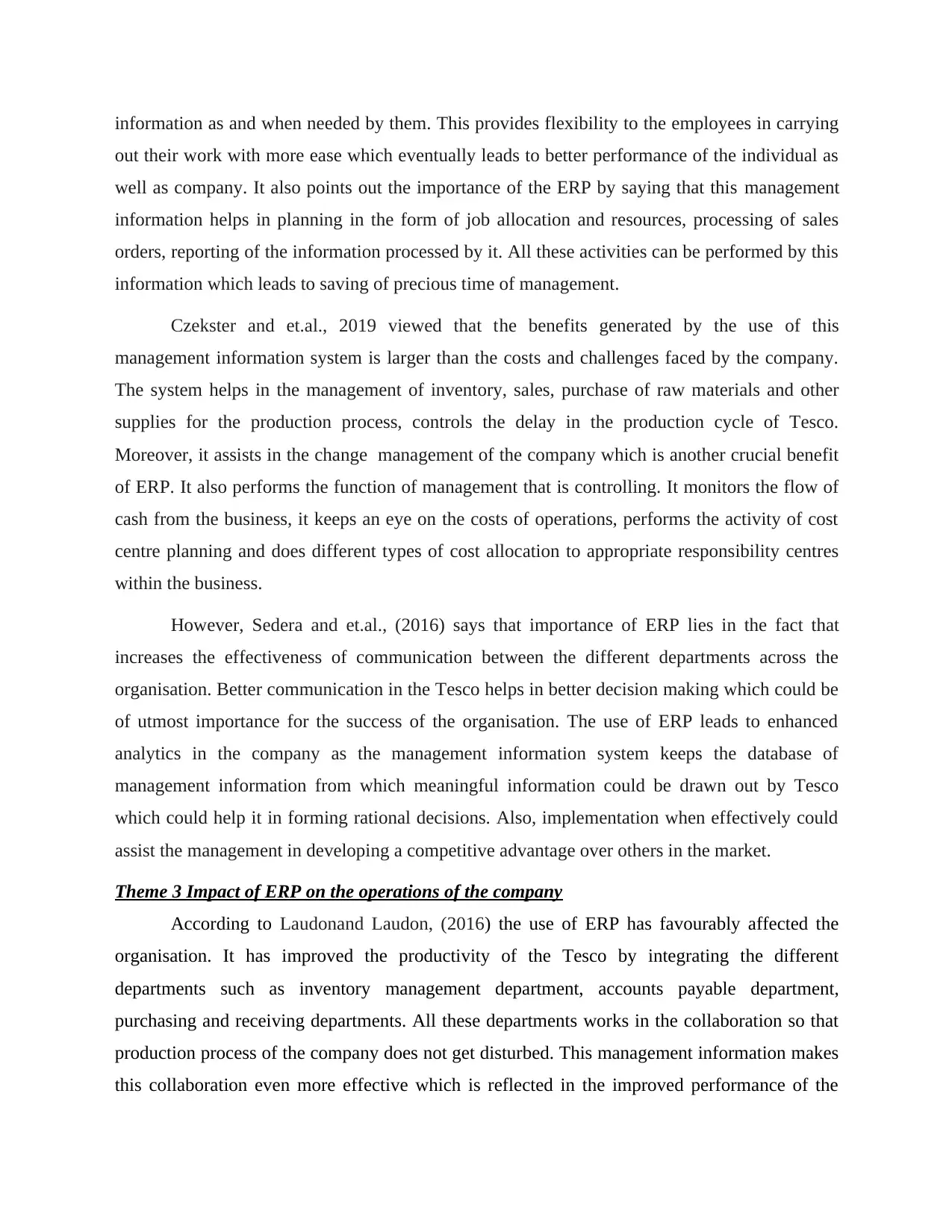
information as and when needed by them. This provides flexibility to the employees in carrying
out their work with more ease which eventually leads to better performance of the individual as
well as company. It also points out the importance of the ERP by saying that this management
information helps in planning in the form of job allocation and resources, processing of sales
orders, reporting of the information processed by it. All these activities can be performed by this
information which leads to saving of precious time of management.
Czekster and et.al., 2019 viewed that the benefits generated by the use of this
management information system is larger than the costs and challenges faced by the company.
The system helps in the management of inventory, sales, purchase of raw materials and other
supplies for the production process, controls the delay in the production cycle of Tesco.
Moreover, it assists in the change management of the company which is another crucial benefit
of ERP. It also performs the function of management that is controlling. It monitors the flow of
cash from the business, it keeps an eye on the costs of operations, performs the activity of cost
centre planning and does different types of cost allocation to appropriate responsibility centres
within the business.
However, Sedera and et.al., (2016) says that importance of ERP lies in the fact that
increases the effectiveness of communication between the different departments across the
organisation. Better communication in the Tesco helps in better decision making which could be
of utmost importance for the success of the organisation. The use of ERP leads to enhanced
analytics in the company as the management information system keeps the database of
management information from which meaningful information could be drawn out by Tesco
which could help it in forming rational decisions. Also, implementation when effectively could
assist the management in developing a competitive advantage over others in the market.
Theme 3 Impact of ERP on the operations of the company
According to Laudonand Laudon, (2016) the use of ERP has favourably affected the
organisation. It has improved the productivity of the Tesco by integrating the different
departments such as inventory management department, accounts payable department,
purchasing and receiving departments. All these departments works in the collaboration so that
production process of the company does not get disturbed. This management information makes
this collaboration even more effective which is reflected in the improved performance of the
out their work with more ease which eventually leads to better performance of the individual as
well as company. It also points out the importance of the ERP by saying that this management
information helps in planning in the form of job allocation and resources, processing of sales
orders, reporting of the information processed by it. All these activities can be performed by this
information which leads to saving of precious time of management.
Czekster and et.al., 2019 viewed that the benefits generated by the use of this
management information system is larger than the costs and challenges faced by the company.
The system helps in the management of inventory, sales, purchase of raw materials and other
supplies for the production process, controls the delay in the production cycle of Tesco.
Moreover, it assists in the change management of the company which is another crucial benefit
of ERP. It also performs the function of management that is controlling. It monitors the flow of
cash from the business, it keeps an eye on the costs of operations, performs the activity of cost
centre planning and does different types of cost allocation to appropriate responsibility centres
within the business.
However, Sedera and et.al., (2016) says that importance of ERP lies in the fact that
increases the effectiveness of communication between the different departments across the
organisation. Better communication in the Tesco helps in better decision making which could be
of utmost importance for the success of the organisation. The use of ERP leads to enhanced
analytics in the company as the management information system keeps the database of
management information from which meaningful information could be drawn out by Tesco
which could help it in forming rational decisions. Also, implementation when effectively could
assist the management in developing a competitive advantage over others in the market.
Theme 3 Impact of ERP on the operations of the company
According to Laudonand Laudon, (2016) the use of ERP has favourably affected the
organisation. It has improved the productivity of the Tesco by integrating the different
departments such as inventory management department, accounts payable department,
purchasing and receiving departments. All these departments works in the collaboration so that
production process of the company does not get disturbed. This management information makes
this collaboration even more effective which is reflected in the improved performance of the
⊘ This is a preview!⊘
Do you want full access?
Subscribe today to unlock all pages.

Trusted by 1+ million students worldwide
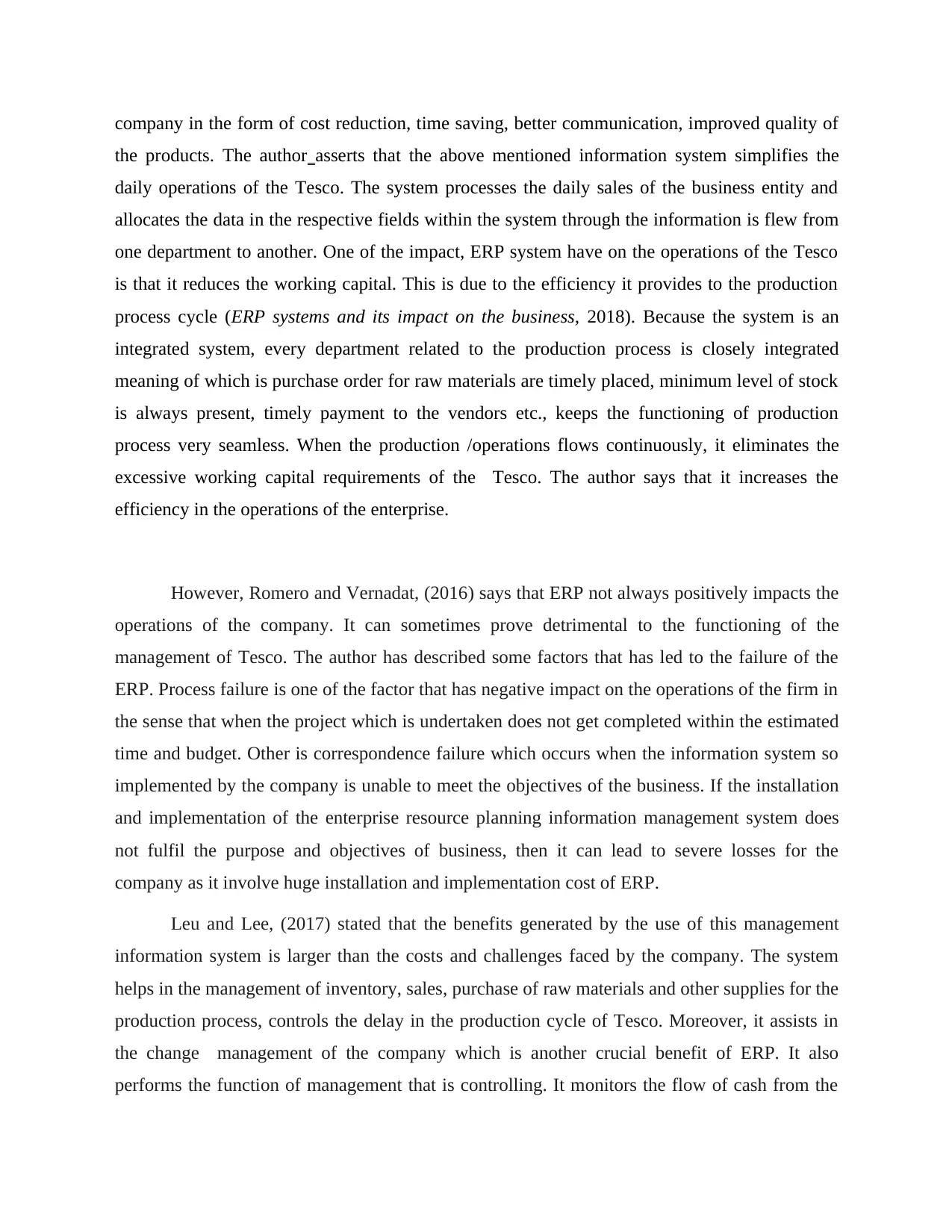
company in the form of cost reduction, time saving, better communication, improved quality of
the products. The author asserts that the above mentioned information system simplifies the
daily operations of the Tesco. The system processes the daily sales of the business entity and
allocates the data in the respective fields within the system through the information is flew from
one department to another. One of the impact, ERP system have on the operations of the Tesco
is that it reduces the working capital. This is due to the efficiency it provides to the production
process cycle (ERP systems and its impact on the business, 2018). Because the system is an
integrated system, every department related to the production process is closely integrated
meaning of which is purchase order for raw materials are timely placed, minimum level of stock
is always present, timely payment to the vendors etc., keeps the functioning of production
process very seamless. When the production /operations flows continuously, it eliminates the
excessive working capital requirements of the Tesco. The author says that it increases the
efficiency in the operations of the enterprise.
However, Romero and Vernadat, (2016) says that ERP not always positively impacts the
operations of the company. It can sometimes prove detrimental to the functioning of the
management of Tesco. The author has described some factors that has led to the failure of the
ERP. Process failure is one of the factor that has negative impact on the operations of the firm in
the sense that when the project which is undertaken does not get completed within the estimated
time and budget. Other is correspondence failure which occurs when the information system so
implemented by the company is unable to meet the objectives of the business. If the installation
and implementation of the enterprise resource planning information management system does
not fulfil the purpose and objectives of business, then it can lead to severe losses for the
company as it involve huge installation and implementation cost of ERP.
Leu and Lee, (2017) stated that the benefits generated by the use of this management
information system is larger than the costs and challenges faced by the company. The system
helps in the management of inventory, sales, purchase of raw materials and other supplies for the
production process, controls the delay in the production cycle of Tesco. Moreover, it assists in
the change management of the company which is another crucial benefit of ERP. It also
performs the function of management that is controlling. It monitors the flow of cash from the
the products. The author asserts that the above mentioned information system simplifies the
daily operations of the Tesco. The system processes the daily sales of the business entity and
allocates the data in the respective fields within the system through the information is flew from
one department to another. One of the impact, ERP system have on the operations of the Tesco
is that it reduces the working capital. This is due to the efficiency it provides to the production
process cycle (ERP systems and its impact on the business, 2018). Because the system is an
integrated system, every department related to the production process is closely integrated
meaning of which is purchase order for raw materials are timely placed, minimum level of stock
is always present, timely payment to the vendors etc., keeps the functioning of production
process very seamless. When the production /operations flows continuously, it eliminates the
excessive working capital requirements of the Tesco. The author says that it increases the
efficiency in the operations of the enterprise.
However, Romero and Vernadat, (2016) says that ERP not always positively impacts the
operations of the company. It can sometimes prove detrimental to the functioning of the
management of Tesco. The author has described some factors that has led to the failure of the
ERP. Process failure is one of the factor that has negative impact on the operations of the firm in
the sense that when the project which is undertaken does not get completed within the estimated
time and budget. Other is correspondence failure which occurs when the information system so
implemented by the company is unable to meet the objectives of the business. If the installation
and implementation of the enterprise resource planning information management system does
not fulfil the purpose and objectives of business, then it can lead to severe losses for the
company as it involve huge installation and implementation cost of ERP.
Leu and Lee, (2017) stated that the benefits generated by the use of this management
information system is larger than the costs and challenges faced by the company. The system
helps in the management of inventory, sales, purchase of raw materials and other supplies for the
production process, controls the delay in the production cycle of Tesco. Moreover, it assists in
the change management of the company which is another crucial benefit of ERP. It also
performs the function of management that is controlling. It monitors the flow of cash from the
Paraphrase This Document
Need a fresh take? Get an instant paraphrase of this document with our AI Paraphraser
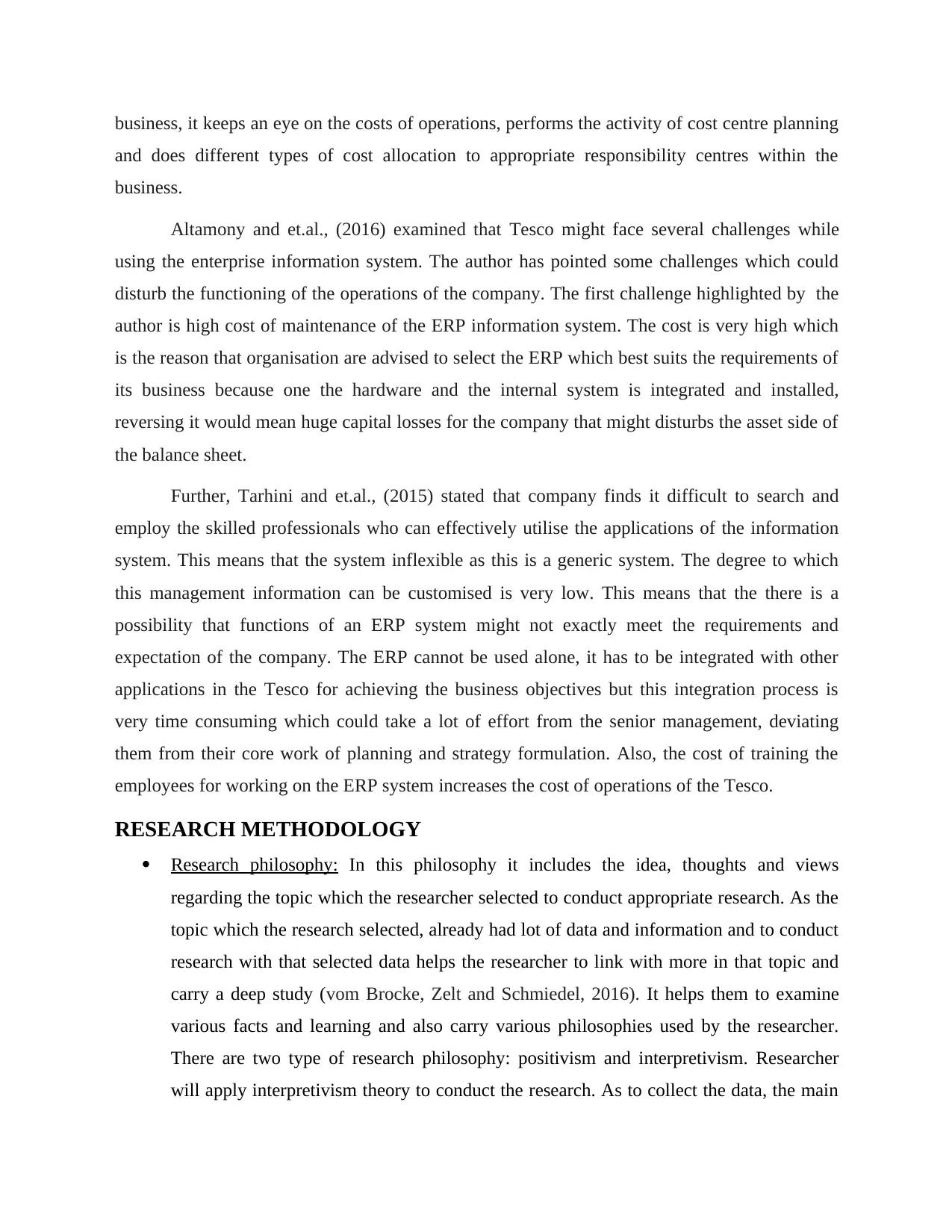
business, it keeps an eye on the costs of operations, performs the activity of cost centre planning
and does different types of cost allocation to appropriate responsibility centres within the
business.
Altamony and et.al., (2016) examined that Tesco might face several challenges while
using the enterprise information system. The author has pointed some challenges which could
disturb the functioning of the operations of the company. The first challenge highlighted by the
author is high cost of maintenance of the ERP information system. The cost is very high which
is the reason that organisation are advised to select the ERP which best suits the requirements of
its business because one the hardware and the internal system is integrated and installed,
reversing it would mean huge capital losses for the company that might disturbs the asset side of
the balance sheet.
Further, Tarhini and et.al., (2015) stated that company finds it difficult to search and
employ the skilled professionals who can effectively utilise the applications of the information
system. This means that the system inflexible as this is a generic system. The degree to which
this management information can be customised is very low. This means that the there is a
possibility that functions of an ERP system might not exactly meet the requirements and
expectation of the company. The ERP cannot be used alone, it has to be integrated with other
applications in the Tesco for achieving the business objectives but this integration process is
very time consuming which could take a lot of effort from the senior management, deviating
them from their core work of planning and strategy formulation. Also, the cost of training the
employees for working on the ERP system increases the cost of operations of the Tesco.
RESEARCH METHODOLOGY
Research philosophy: In this philosophy it includes the idea, thoughts and views
regarding the topic which the researcher selected to conduct appropriate research. As the
topic which the research selected, already had lot of data and information and to conduct
research with that selected data helps the researcher to link with more in that topic and
carry a deep study (vom Brocke, Zelt and Schmiedel, 2016). It helps them to examine
various facts and learning and also carry various philosophies used by the researcher.
There are two type of research philosophy: positivism and interpretivism. Researcher
will apply interpretivism theory to conduct the research. As to collect the data, the main
and does different types of cost allocation to appropriate responsibility centres within the
business.
Altamony and et.al., (2016) examined that Tesco might face several challenges while
using the enterprise information system. The author has pointed some challenges which could
disturb the functioning of the operations of the company. The first challenge highlighted by the
author is high cost of maintenance of the ERP information system. The cost is very high which
is the reason that organisation are advised to select the ERP which best suits the requirements of
its business because one the hardware and the internal system is integrated and installed,
reversing it would mean huge capital losses for the company that might disturbs the asset side of
the balance sheet.
Further, Tarhini and et.al., (2015) stated that company finds it difficult to search and
employ the skilled professionals who can effectively utilise the applications of the information
system. This means that the system inflexible as this is a generic system. The degree to which
this management information can be customised is very low. This means that the there is a
possibility that functions of an ERP system might not exactly meet the requirements and
expectation of the company. The ERP cannot be used alone, it has to be integrated with other
applications in the Tesco for achieving the business objectives but this integration process is
very time consuming which could take a lot of effort from the senior management, deviating
them from their core work of planning and strategy formulation. Also, the cost of training the
employees for working on the ERP system increases the cost of operations of the Tesco.
RESEARCH METHODOLOGY
Research philosophy: In this philosophy it includes the idea, thoughts and views
regarding the topic which the researcher selected to conduct appropriate research. As the
topic which the research selected, already had lot of data and information and to conduct
research with that selected data helps the researcher to link with more in that topic and
carry a deep study (vom Brocke, Zelt and Schmiedel, 2016). It helps them to examine
various facts and learning and also carry various philosophies used by the researcher.
There are two type of research philosophy: positivism and interpretivism. Researcher
will apply interpretivism theory to conduct the research. As to collect the data, the main
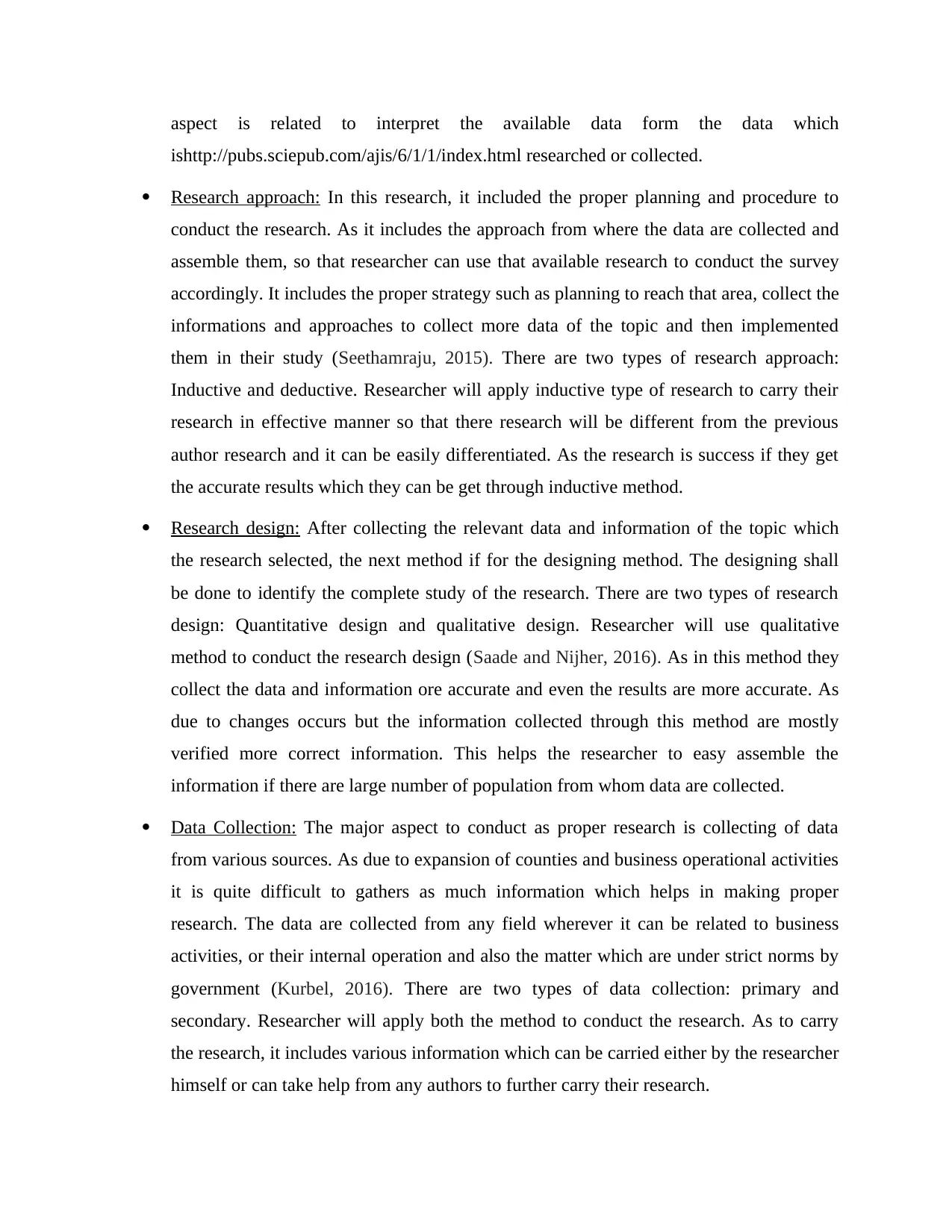
aspect is related to interpret the available data form the data which
ishttp://pubs.sciepub.com/ajis/6/1/1/index.html researched or collected.
Research approach: In this research, it included the proper planning and procedure to
conduct the research. As it includes the approach from where the data are collected and
assemble them, so that researcher can use that available research to conduct the survey
accordingly. It includes the proper strategy such as planning to reach that area, collect the
informations and approaches to collect more data of the topic and then implemented
them in their study (Seethamraju, 2015). There are two types of research approach:
Inductive and deductive. Researcher will apply inductive type of research to carry their
research in effective manner so that there research will be different from the previous
author research and it can be easily differentiated. As the research is success if they get
the accurate results which they can be get through inductive method.
Research design: After collecting the relevant data and information of the topic which
the research selected, the next method if for the designing method. The designing shall
be done to identify the complete study of the research. There are two types of research
design: Quantitative design and qualitative design. Researcher will use qualitative
method to conduct the research design (Saade and Nijher, 2016). As in this method they
collect the data and information ore accurate and even the results are more accurate. As
due to changes occurs but the information collected through this method are mostly
verified more correct information. This helps the researcher to easy assemble the
information if there are large number of population from whom data are collected.
Data Collection: The major aspect to conduct as proper research is collecting of data
from various sources. As due to expansion of counties and business operational activities
it is quite difficult to gathers as much information which helps in making proper
research. The data are collected from any field wherever it can be related to business
activities, or their internal operation and also the matter which are under strict norms by
government (Kurbel, 2016). There are two types of data collection: primary and
secondary. Researcher will apply both the method to conduct the research. As to carry
the research, it includes various information which can be carried either by the researcher
himself or can take help from any authors to further carry their research.
ishttp://pubs.sciepub.com/ajis/6/1/1/index.html researched or collected.
Research approach: In this research, it included the proper planning and procedure to
conduct the research. As it includes the approach from where the data are collected and
assemble them, so that researcher can use that available research to conduct the survey
accordingly. It includes the proper strategy such as planning to reach that area, collect the
informations and approaches to collect more data of the topic and then implemented
them in their study (Seethamraju, 2015). There are two types of research approach:
Inductive and deductive. Researcher will apply inductive type of research to carry their
research in effective manner so that there research will be different from the previous
author research and it can be easily differentiated. As the research is success if they get
the accurate results which they can be get through inductive method.
Research design: After collecting the relevant data and information of the topic which
the research selected, the next method if for the designing method. The designing shall
be done to identify the complete study of the research. There are two types of research
design: Quantitative design and qualitative design. Researcher will use qualitative
method to conduct the research design (Saade and Nijher, 2016). As in this method they
collect the data and information ore accurate and even the results are more accurate. As
due to changes occurs but the information collected through this method are mostly
verified more correct information. This helps the researcher to easy assemble the
information if there are large number of population from whom data are collected.
Data Collection: The major aspect to conduct as proper research is collecting of data
from various sources. As due to expansion of counties and business operational activities
it is quite difficult to gathers as much information which helps in making proper
research. The data are collected from any field wherever it can be related to business
activities, or their internal operation and also the matter which are under strict norms by
government (Kurbel, 2016). There are two types of data collection: primary and
secondary. Researcher will apply both the method to conduct the research. As to carry
the research, it includes various information which can be carried either by the researcher
himself or can take help from any authors to further carry their research.
⊘ This is a preview!⊘
Do you want full access?
Subscribe today to unlock all pages.

Trusted by 1+ million students worldwide
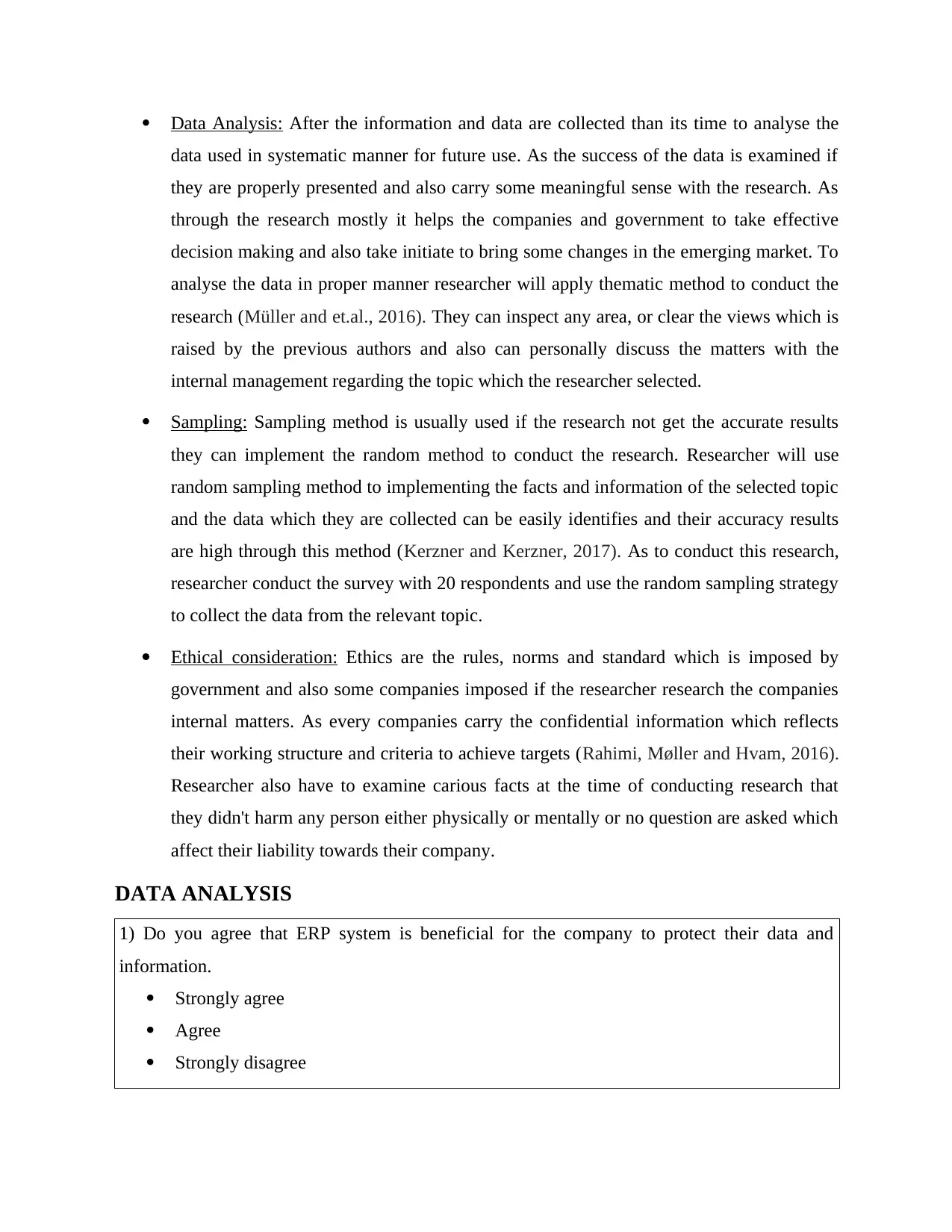
Data Analysis: After the information and data are collected than its time to analyse the
data used in systematic manner for future use. As the success of the data is examined if
they are properly presented and also carry some meaningful sense with the research. As
through the research mostly it helps the companies and government to take effective
decision making and also take initiate to bring some changes in the emerging market. To
analyse the data in proper manner researcher will apply thematic method to conduct the
research (Müller and et.al., 2016). They can inspect any area, or clear the views which is
raised by the previous authors and also can personally discuss the matters with the
internal management regarding the topic which the researcher selected.
Sampling: Sampling method is usually used if the research not get the accurate results
they can implement the random method to conduct the research. Researcher will use
random sampling method to implementing the facts and information of the selected topic
and the data which they are collected can be easily identifies and their accuracy results
are high through this method (Kerzner and Kerzner, 2017). As to conduct this research,
researcher conduct the survey with 20 respondents and use the random sampling strategy
to collect the data from the relevant topic.
Ethical consideration: Ethics are the rules, norms and standard which is imposed by
government and also some companies imposed if the researcher research the companies
internal matters. As every companies carry the confidential information which reflects
their working structure and criteria to achieve targets (Rahimi, Møller and Hvam, 2016).
Researcher also have to examine carious facts at the time of conducting research that
they didn't harm any person either physically or mentally or no question are asked which
affect their liability towards their company.
DATA ANALYSIS
1) Do you agree that ERP system is beneficial for the company to protect their data and
information.
Strongly agree
Agree
Strongly disagree
data used in systematic manner for future use. As the success of the data is examined if
they are properly presented and also carry some meaningful sense with the research. As
through the research mostly it helps the companies and government to take effective
decision making and also take initiate to bring some changes in the emerging market. To
analyse the data in proper manner researcher will apply thematic method to conduct the
research (Müller and et.al., 2016). They can inspect any area, or clear the views which is
raised by the previous authors and also can personally discuss the matters with the
internal management regarding the topic which the researcher selected.
Sampling: Sampling method is usually used if the research not get the accurate results
they can implement the random method to conduct the research. Researcher will use
random sampling method to implementing the facts and information of the selected topic
and the data which they are collected can be easily identifies and their accuracy results
are high through this method (Kerzner and Kerzner, 2017). As to conduct this research,
researcher conduct the survey with 20 respondents and use the random sampling strategy
to collect the data from the relevant topic.
Ethical consideration: Ethics are the rules, norms and standard which is imposed by
government and also some companies imposed if the researcher research the companies
internal matters. As every companies carry the confidential information which reflects
their working structure and criteria to achieve targets (Rahimi, Møller and Hvam, 2016).
Researcher also have to examine carious facts at the time of conducting research that
they didn't harm any person either physically or mentally or no question are asked which
affect their liability towards their company.
DATA ANALYSIS
1) Do you agree that ERP system is beneficial for the company to protect their data and
information.
Strongly agree
Agree
Strongly disagree
Paraphrase This Document
Need a fresh take? Get an instant paraphrase of this document with our AI Paraphraser
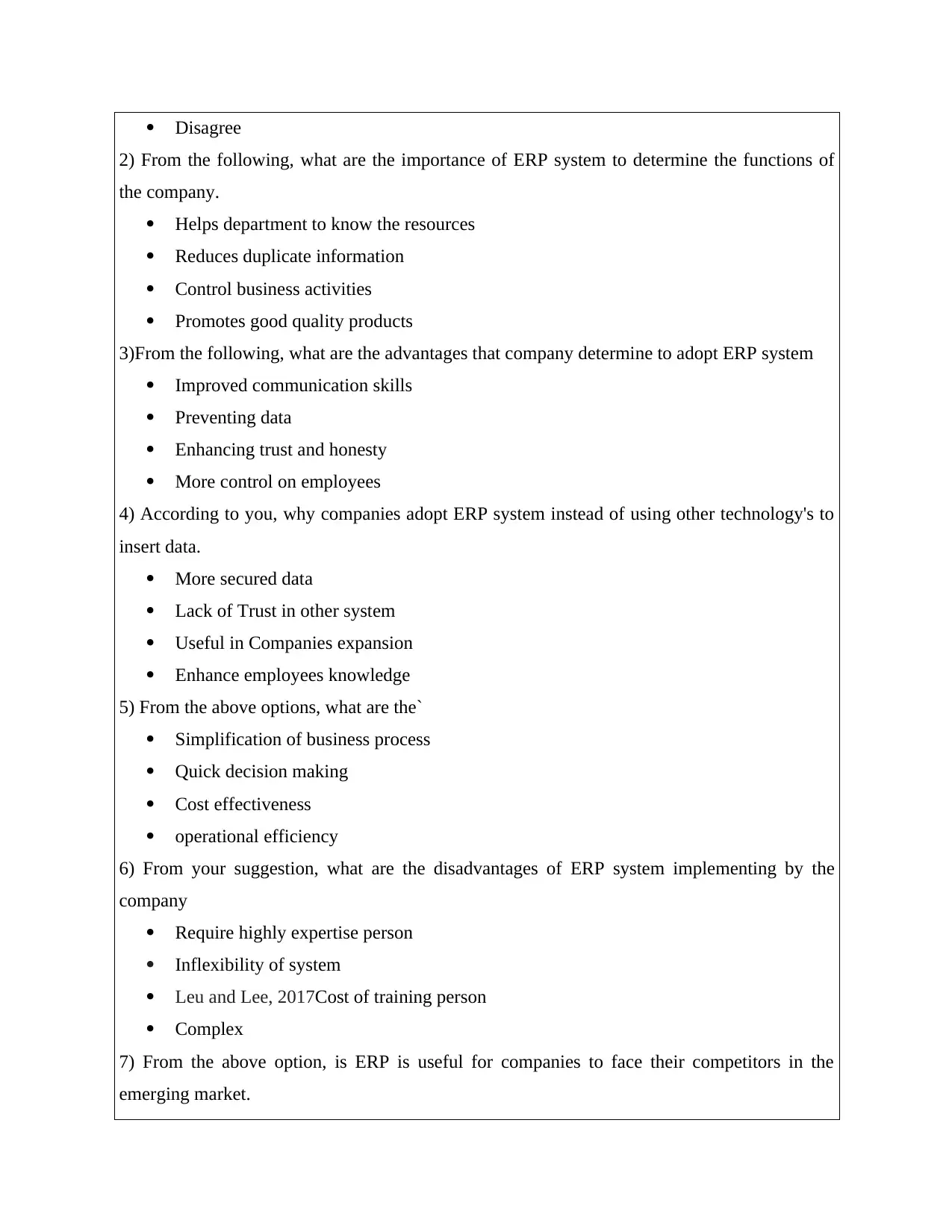
Disagree
2) From the following, what are the importance of ERP system to determine the functions of
the company.
Helps department to know the resources
Reduces duplicate information
Control business activities
Promotes good quality products
3)From the following, what are the advantages that company determine to adopt ERP system
Improved communication skills
Preventing data
Enhancing trust and honesty
More control on employees
4) According to you, why companies adopt ERP system instead of using other technology's to
insert data.
More secured data
Lack of Trust in other system
Useful in Companies expansion
Enhance employees knowledge
5) From the above options, what are the`
Simplification of business process
Quick decision making
Cost effectiveness
operational efficiency
6) From your suggestion, what are the disadvantages of ERP system implementing by the
company
Require highly expertise person
Inflexibility of system
Leu and Lee, 2017Cost of training person
Complex
7) From the above option, is ERP is useful for companies to face their competitors in the
emerging market.
2) From the following, what are the importance of ERP system to determine the functions of
the company.
Helps department to know the resources
Reduces duplicate information
Control business activities
Promotes good quality products
3)From the following, what are the advantages that company determine to adopt ERP system
Improved communication skills
Preventing data
Enhancing trust and honesty
More control on employees
4) According to you, why companies adopt ERP system instead of using other technology's to
insert data.
More secured data
Lack of Trust in other system
Useful in Companies expansion
Enhance employees knowledge
5) From the above options, what are the`
Simplification of business process
Quick decision making
Cost effectiveness
operational efficiency
6) From your suggestion, what are the disadvantages of ERP system implementing by the
company
Require highly expertise person
Inflexibility of system
Leu and Lee, 2017Cost of training person
Complex
7) From the above option, is ERP is useful for companies to face their competitors in the
emerging market.
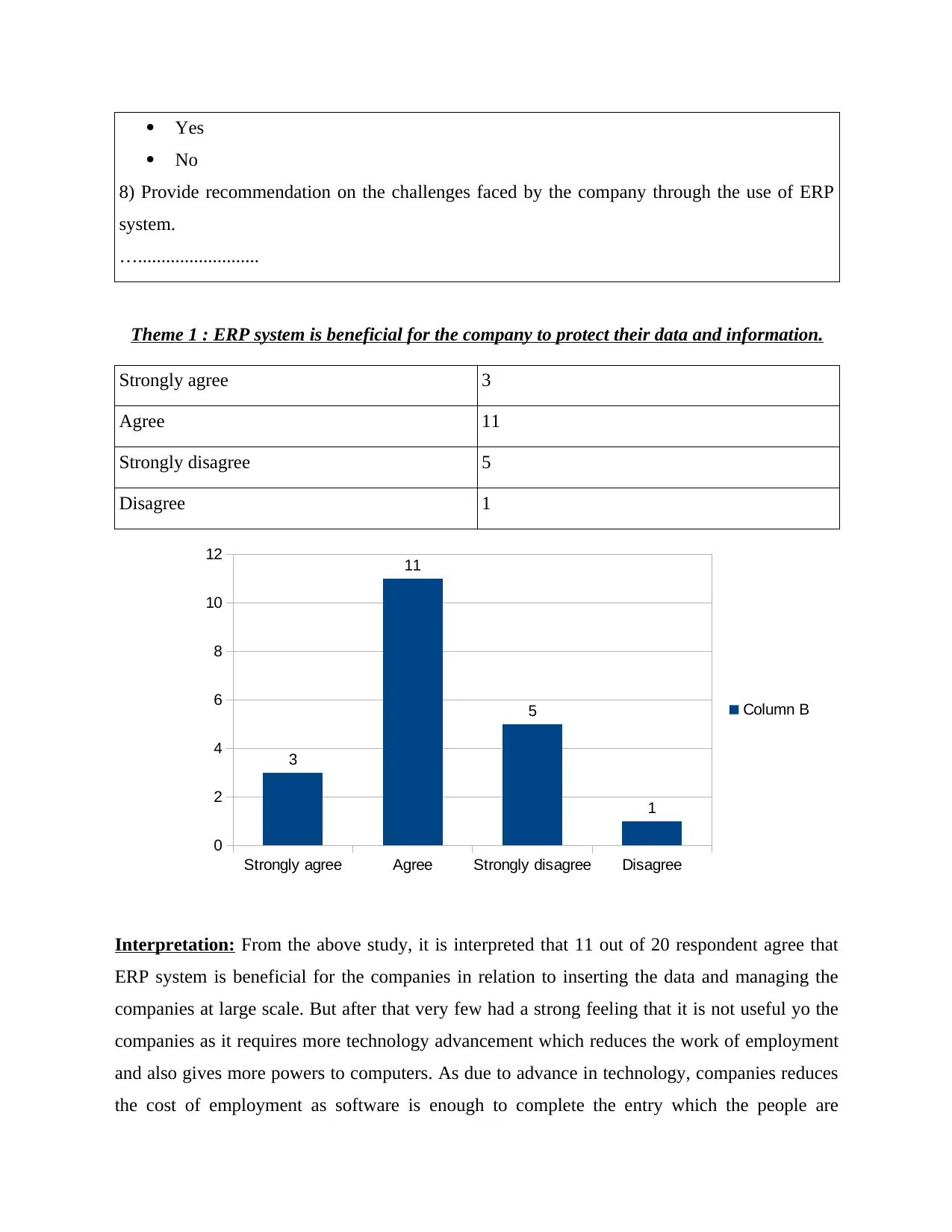
Yes
No
8) Provide recommendation on the challenges faced by the company through the use of ERP
system.
…..........................
Theme 1 : ERP system is beneficial for the company to protect their data and information.
Strongly agree 3
Agree 11
Strongly disagree 5
Disagree 1
Interpretation: From the above study, it is interpreted that 11 out of 20 respondent agree that
ERP system is beneficial for the companies in relation to inserting the data and managing the
companies at large scale. But after that very few had a strong feeling that it is not useful yo the
companies as it requires more technology advancement which reduces the work of employment
and also gives more powers to computers. As due to advance in technology, companies reduces
the cost of employment as software is enough to complete the entry which the people are
Strongly agree Agree Strongly disagree Disagree
0
2
4
6
8
10
12
3
11
5
1
Column B
No
8) Provide recommendation on the challenges faced by the company through the use of ERP
system.
…..........................
Theme 1 : ERP system is beneficial for the company to protect their data and information.
Strongly agree 3
Agree 11
Strongly disagree 5
Disagree 1
Interpretation: From the above study, it is interpreted that 11 out of 20 respondent agree that
ERP system is beneficial for the companies in relation to inserting the data and managing the
companies at large scale. But after that very few had a strong feeling that it is not useful yo the
companies as it requires more technology advancement which reduces the work of employment
and also gives more powers to computers. As due to advance in technology, companies reduces
the cost of employment as software is enough to complete the entry which the people are
Strongly agree Agree Strongly disagree Disagree
0
2
4
6
8
10
12
3
11
5
1
Column B
⊘ This is a preview!⊘
Do you want full access?
Subscribe today to unlock all pages.

Trusted by 1+ million students worldwide
1 out of 23
Related Documents
Your All-in-One AI-Powered Toolkit for Academic Success.
+13062052269
info@desklib.com
Available 24*7 on WhatsApp / Email
![[object Object]](/_next/static/media/star-bottom.7253800d.svg)
Unlock your academic potential
Copyright © 2020–2025 A2Z Services. All Rights Reserved. Developed and managed by ZUCOL.





